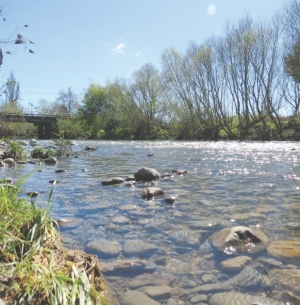Lynch has been involved in the council instigating a prosecution against a Waikato drystock farmer who allegedly took water for pasture irrigation in the drought last summer without any right to do so. The case has still to be proven in court. However the fact the council has taken the action “reflects a changing focus on a very valuable resource,” Lynch says.
“The Waikato region is now facing droughts which historically we haven’t had to contend with that often, but now, whether it is climate change or whatever reasons, there appears to be drought occurring on a more frequent basis. These are putting farming communities under a lot more pressure to access and manage water.”
Lynch says the prosecution is being taken under longstanding rules under the Resource Management Act (RMA). It is not related to the more recent variation 6 in the Waikato Regional Plan which particularly pertains to dairy farmers needing to apply for water rights for their historic use of water for dairy sheds.
Damming, taking and using water are unlawful as of right under the Resource Management Act unless it is expressly allowed, Lynch says. “There has to be a specific permission to take water. In Waikato, for instance, it is accepted for things like domestic use, for watering stock, that kind of thing. The regional plan allows for that, you don’t need a consent; that is absolutely fine.
“But with small watercourses, if people started tapping into them for industrial uses the watercourses will never run downstream. The downstream users who are relying on it for watering their animals and that kind of thing will miss out. It is really about water management.”
Lynch says this particular prosecution is for allegedly breaching the act by taking the water without any kind of permission. The water was allegedly taken in the midst of possibly one of the worst droughts the Waikato has seen. “The entire region had to deal with the challenges of the drought. Farming practices had to be amended accordingly.”
There are two-fold effects in taking water without permission: the direct environmental effect at an ecological level; and the human level, with downstream users relying on it for domestic use, watering their stock or other processes for which they may have gained a legal right.
Federated Farmers Waikato provincial president James Houghton says farmers want to know that councils will act fairly and take a tough line on those operating outside legal requirements.
During the drought, people who actually had the legal consents to irrigate were made to stop because of water restrictions. They would naturally be frustrated if anyone “flouted” restrictions and irrigated without the legal consents.
Regional councils are trying to manage water for all, he says. It can be frustrating for farmers to have to go through the processes when the water passes through their land. “But at times we’ve got to look at the whole picture,” he says.
Federated Farmers’ dairy spokesman Willy Leferink says taking water without consent means “you nick it off somebody else”. “It is like taking money out of somebody else’s wallet.”
Farmers in general are complying with the rules and councils are working a lot better alongside farmers. “The councils have to tread a fine line because if they become hardened like some do, then there will be a revolt and with the elections there will be a whole lot of new councillors.
“I don’t condone people taking water without consents, but where the councils work very well with the farmers and the public you don’t have any issue. Taranaki is an example. Farmers are pretty aware about water restrictions.”
However both Lynch and Leferink say there is more work to do on the fairness of distribution of water in Waikato. Lynch says “there’s a lot of water going out to sea” because of the way the take is calculated on 20% of the lowest flow of a one in five-year drought. The rest of the time there will be double or triple that amount of water. He is also concerned that Auckland wants to take more water from the Waikato; that will set trigger levels for the whole catchment and farmers will not be able to take more water.
Also he says in the upper Waikato catchment – where the farmer facing prosecution is – there is a determination that most of the water has to stay for hydro-electricity generation. “We proved in the Environment Court there were a lot more productive gains in using that water for farming than there is for hydro-generation,” he says.
Leferink says, “Mighty River Power thought they had the privilege because they were a community business. They are not a community business any more – they are profit driven business; they should now become just another one in the line with a right to water.”
















